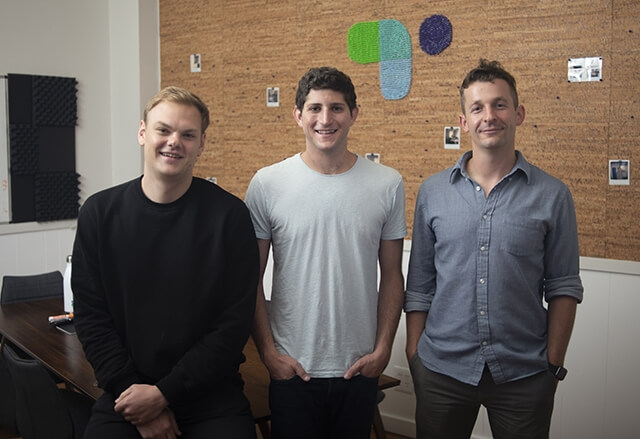Truework co-founders (from left) Ethan Winchell, Ryan Sandler, and Victor Kabdebon
As COVID-19 restrictions continue to loosen across the nation and businesses large and small begin to reopen, human resources teams are facing a new conundrum: how to determine which employees can safely return to work, and when.
Truework, a platform for employment and income verification co-founded by Harvard John A. Paulson School of Engineering and Applied Sciences alumni Ryan Sandler and Ethan Winchell, and Victor Kabdebon, has a solution. The startup recently launched a tool that enables firms to securely verify employees’ COVID-19 health status.
“We were listening to our customers and learned how businesses are going to need a way to manage and track this health information in a private way so employees can return to work. There were no tools to do that easily,” said Sandler, A.B. ’14, a computer science concentrator. “It is a real pressing issue, especially for smaller businesses that don’t have policy or compliance teams to figure this out.”
The tool developed by the Truework team integrates health data from various sources, such as laboratory test results and contact tracing apps, while enabling employees to give explicit consent before that sensitive information is shared with their HR department. A dashboard enables HR teams to easily manage and track all employees’ information in one secure place, and seamlessly connect it to different human resources information systems.
To the co-founders, it’s a natural extension of Truework’s flagship product, which provides a user-friendly consent platform for employment and income verification. The product streamlines and digitizes a series of time-consuming processes that have traditionally been controlled by the major credit bureaus.
“Every time someone seeks a loan or an apartment rental or gets a new job, there is a bank or a third party that needs to verify their information, including income, employment, address history, etc. That data is flowing around a lot of different places online and offline,” Sandler said. “At Truework, our goal is to put sensitive information behind consumers’ consent. The consumer actually has to see the data and consent to it before it is released to a bank, landlord, or any third party.”
The Truework platform automates the process so HR departments no longer need to respond directly to requests from lenders, landlords, background check companies, and others. And whenever a third party requests sensitive data, like income, the employee receives an email or text with specific details about the inquiry and is given the option to approve or deny the request.
When building the platform, the team invested much of their time in creating a robust security infrastructure to ensure the sensitive data remains private, Sandler said. In addition to maintaining security certifications ISO27001 and SOC2 Type 1 and 2, the firm employs a team dedicated to security.
For Sandler and Winchell, who met freshman year and were roommates in Adams House, seeing Truework grow from just an idea in 2018 to a company with more than 20,000 small business customers has been a thrill ride.
“One of the challenges we’ve faced is that there is always more to do than you can do,” said Winchell, S.B. ’14, an electrical engineering concentrator. “We have this grand vision of where we want to go, and we have a strong conviction of what we need to do to get there, but it is always a challenge when you need to scope down that problem on a monthly or a quarterly basis and actually hit goals on that time horizon that you sequence together to ultimately get you to your vision.”
At Harvard, they both had an interest in startups and took the SEAS course Startup R&D (ES 95r), but neither was entirely sure what their entrepreneurial futures might look like. After spending a few years in industry—Sandler at LinkedIn and Winchell at the wearables company Ringly—they decided to quit their jobs and dive into entrepreneurship.
They spent a lot of time talking with people in the human resources and finance fields and learned that many firms still rely on faxes and phone calls for these verifications, which leads to weeks-long delays in mortgages and other loans, Sandler said.
They saw an opportunity to innovate.
“As people are making more loans and transactions digitally, those digital lenders or rental websites need to do this in a more automated way,” he said. “A general, digital transformation is happening, and we are providing a core identity layer to power all of those vectors.”
The company recently raised $30 million in a Series B funding round and continues to build momentum. Looking to the future, the co-founders are excited to continue implementing the COVID-19 product and listening to customers about other ways they can leverage Truework to innovate in new spaces.
“It has been pretty amazing and surreal to see the company grow this much. It feels like yesterday it was just the three of us in San Francisco with an idea. Then we built the company not knowing if it was going to work,” Sandler said. “So, it’s been rewarding seeing the reception and continuing to grow and having such a great team that has trusted us and come to join us on this journey.”
Press Contact
Adam Zewe | 617-496-5878 | azewe@seas.harvard.edu
